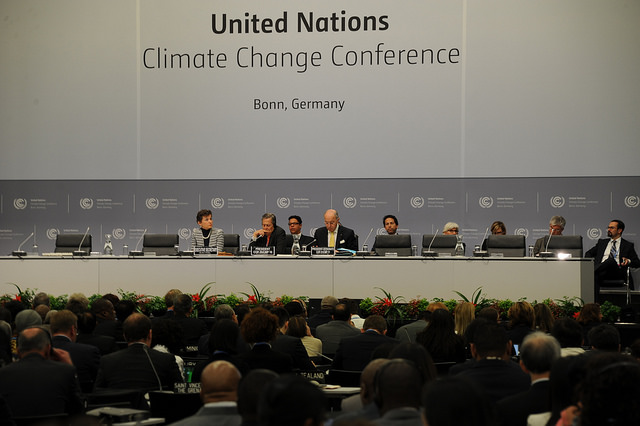
By Atâyi Babs
Amidst growing concerns over global rising temperatures and extreme weather events, the Bonn Climate Change Conference opened on Monday, 1 June, with about 196 governments attending the welcoming ceremony, which was followed by the opening plenaries of the ADP, SBSTA and SBI to open agenda items for consideration during SB 42 and ADP 2-9.
UNFCCC Executive Secretary Christiana Figueres said this session should be seen as “a construction site” for the subsidiary bodies and the ADP to pave the way for the 2015 agreement.
In a recorded video address, COP 20/CMP 10 President Manuel Pulgar-Vidal, Minister of Environment, Peru, stressed that it is “negotiating time.” He stated that the Paris outcome could include: a core instrument that is legally binding; a target for carbon neutrality; a process for the regular communication of NDCs; a long-term qualitative goal for adaptation; substantial progress on climate finance; provisions on loss and damage; and the launch of a global effort to scale up technology and capacity building.
Incoming COP 21/CMP 11 President Laurent Fabius, Foreign Minister, France, suggested four pillars will underpin success in Paris: a universal, legally-binding agreement; INDCs; finance, technology and capacity-building (MOI); and the role and contributions of non-state actors. He urged progress on: distinguishing what will be included in either the agreement or COP decisions; determining the major political issues that ministers must decide upon; and preparing a decision on pre-2020 action for adoption in Paris.
Nagmeldin G Elhassan, Chair of the AFRICAN GROUP, said he expects issues requiring decisions in Paris to be finalized in Bonn, and expressed hope that the Adaptation Committee and the LEG, in collaboration with the GCF, will determine how to support developing countries in accessing funding from the GCF for NAPs.
Talks amidst broken temperature records
The Bonn talks unfold against a backdrop of record global temperatures and extreme weather events.
Every month of 2015 so far has broken temperature records, and people around the world are struggling to cope with weather disasters, like the current heat waves in India and Mali. As these impacts hit home, momentum for scaling up climate action is building.
Businesses backed increased action at the Business and Climate Summit in Paris last month, investment in renewable energy is growing even as the coal industry’s downward spiral accelerates. More and more moral voices are calling out the need for action including the Pope who is expected to release an encyclical that will cover climate change later this month.
Countries responsible for 58% of the world’s emissions have lodged their climate action offers toward the Paris agreement so far. These offers as spelt out in their INDCs outline how these countries will transition from fossil fuels to renewable energy. It is expected that countries negotiating at the Bonn Conference will display commitment by harnessing this momentum and taking meaningful steps towards codifying a strong Paris agreement.
Climate change is happening now
According to ActionAid’s Harjeet Singh,“the message is very clear – climate change is happening now…as we sit here, India is going through an exceptional, unprecedented heatwave. Over 2000 people have lost their lives. As an early monsoon hits Nepal, those still without shelter after the earthquake are suffering. That’s why the Paris agreement needs to deliver plans to make communities resilient and deal with the loss and damage caused by these impacts.”
Speaking on behalf of the African civil society, the Pan African Climate Justice Alliance (PACJA) lamented Annex I countries’ lack of pre-2020 ambition and called on governments to phase out all fossil fuel emissions as early as possible. The alliance further reiterated their call for polluters to pay for the real price of their emissions.
Echoing the need for negotiators at the Bonn meeting to streamline and provide the necessary direction for the legal form of the Paris agreement, Jaco du Toit of WWF International said “We arrived here in Bonn with a 90 page draft Paris agreement that contains options on key issues that cover the good, the bad and the kitchen sink. Negotiators will be working to streamline and consolidate some options and start negotiating contentious topics such as how to treat countries with different capabilities fairly in the agreement and what the legal form of the agreement should be.”











